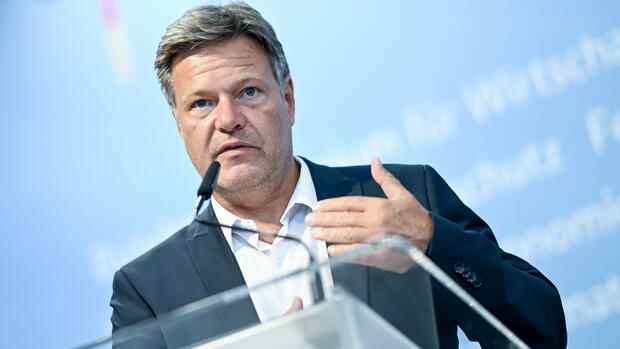The levy is anything but “fair” and “accurate”, as the Economics Minister claims.
(Photo: dpa)
The federal government demands a lot from consumers with the gas surcharge. Private households have to make a contribution so that large energy companies like Uniper don’t go bankrupt. This is an impertinence, especially for low earners who are already suffering from the rising prices for electricity and gas.
The federal government is aware of this. That is why Chancellor Olaf Scholz announced on Thursday that VAT on gas would be reduced. And that’s why Economics Minister Robert Habeck has also built up a very large threat to justify the levy. “The alternative would be the collapse of the German energy market,” warned the Greens politician.
Habeck’s warning is entirely justified. However, the horror scenario can at best justify part of the surcharge. Half of the 34 billion euros that gas customers are supposed to pay to support the energy industry will benefit gas importers, whose existence is anything but threatened. On the contrary: Many of the twelve companies that benefit from the levy are even earning excellent money from the high wholesale gas prices.
The levy is therefore anything but “fair” and “accurate”, as Habeck claims. Rather, it invites high free-rider effects. The citizens, who are suffering from a multiplication of their energy bills, will hardly understand this.
Top jobs of the day
Find the best jobs now and
be notified by email.
It was undoubtedly right that the federal government intervened in the gas market to prevent a collapse. Germany’s largest gas importer Uniper is indeed in a situation that threatens its existence. The company is no longer getting as much gas from Russia as ordered and now has to buy gas wholesale at dramatically increased prices in order to be able to supply its own customers – especially municipal utilities. If Uniper were to collapse, it would result in a chain reaction.
The government is to blame for enabling the deadweight gains
The energy group EnBW is one of the companies that will benefit from the surcharge and will not be threatened in terms of their existence. Its gas trading subsidiary VNG is also suffering from the reduced deliveries from Russia. However, the company is able to offset the losses with its other businesses.
The example of RWE also shows how poorly thought-out the levy is. Even Germany’s largest electricity producer, which recently raised its forecast sharply thanks to the high energy prices, would be entitled to the surcharge. Consumers would have to pay for the company, which is bursting with power – if the company hadn’t recognized how absurd that would be and voluntarily renounced it. Some international commodities traders, who are happy to take the levy with them despite high profits, were not so sensible.
That may be morally reprehensible. Ultimately, however, it is the fault of the federal government, which has given companies this opportunity. The gas surcharge is simply the wrong answer to the problems of the largest German importer. And even if the federal government now wants to absorb the consequences for consumers by reducing VAT, it is difficult to convey it to the citizens.
At a time when consumers are facing skyrocketing inflation and with it a drastic increase in their cost of living – driven primarily by electricity and gas – should they use their electricity bills to support financially healthy gas traders? That is simply unacceptable.
More: That’s how dependent Gazprom is on Europe
